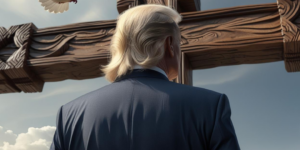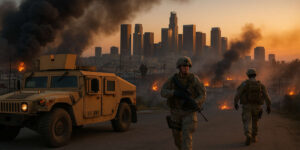Pastor Plants Churches With Terrorist
Criminals sit jam-packed in a filthy Indian holding cell. The smell of urine permeates the dank air.
Two bedraggled men in the corner stand out—not because of their threadbare clothes or clean-cut features but because of their actions. Pabitra Kata hums a hymn while Niladri Kanhar prays.
Their alleged crime: “proselytizing,” trying to convert others to their religion.
Local authorities accuse the two of coercing a Hindu man into becoming a Christian. Neither denies that he was sharing a Bible story, but the word “coercion” makes them shake their heads in disbelief.
Claiming Christianity here in India’s Orissa State means persecution and brutal beatings. Both men have the scars to prove it. Kanhar has an eight-inch scar along his right side; Kata sports a hairless, jagged line above his right ear where his head is caved in from a beating.
Kata glances at his friend, deep in prayer, and remembers his own fervent prayer that started their journey six years ago.
“Lord, give me just one family to build Your church on,” Kata begged God in 2005. “We need a family that can stand strong like a rock—like Your disciple Peter.”
The Holy Spirit answered by leading the pastor up a mountain path and through the forest. When he stopped at the edge of a well-known terrorist village, Kata couldn’t believe it. This paramilitary group often killed or terrorized Christians in a nationalist effort to keep India strictly Hindu. To make matters worse, one of the most feared leaders lived in this village. He destroyed churches, beat or raped Christians and even killed them.
“Surely,” Kata thought, “God isn’t this crazy!”
Obviously, he made a wrong turn in the forest, Kata thought. The pastor walked back home, pleading the entire way for just one family.
Inside the village, Kanhar sat in his house, a broken and angry man. All five of his children were sick. Despite his powerful position as the local terrorist leader, there was nothing he could do to make things better for his family. He already had tried everything—medical doctors, offerings at the Hindu temple and witchcraft.
He gave all his money and possessions to one of the gods but nothing changed. When Kanhar consulted this god one last time, it told him someone in his house would die.
“I did everything you asked. We have become beggars and still we are suffering,” Kanhar screamed. “If you are not able to save us, go away and send us someone who can!”
The pastor sat straight up in bed. The vivid dream startled him awake. It was as if someone called out to him. He replayed the fragmented images in his head: a mountain path, a village and a falling tree. The tree pointed to the terrorist leader’s mud-packed home that emanated sorrow and mourning.
Kata dressed and told his wife that a family needed prayer. Then he scurried up the mountain path to the most feared home in the region.
He arrived too late. Kanhar’s eldest daughter had died during the night. The terrorist leader’s wife met the pastor at the door, explaining her husband took the body to the hospital for a death certificate. She advised Kata to leave before her husband returned. Kanhar hated Christians, and she didn’t want to see anyone else die today. She had enough pain inside her for a lifetime.
The pastor pleaded with the mourning mother not to give up hope. They just needed to pray. She said she didn’t know how, so he urged her to repeat “in Jesus’ name” throughout the night. He promised to return at 10 a.m. the next day to meet the girl in person.
The next morning, Kanhar and his daughter walked hand-in-hand up the path to their home. The pastor wasn’t surprised, but no one else could believe their eyes. The doctors pronounced her dead and now she ran to hug her mother.
Kanhar eyed the strange man standing at their door. Kata smiled, extended his hand and said, “I’m your new friend, Pabitra Kata.”
Recognition registered on Kanhar’s face. His orders were to kill this pastor in the quest to wipe out Christianity. His eyes wandered around the yard, searching for anything he could use as a weapon.
“We hate Jesus here,” the terrorist stated, moving toward the pastor.
Kanhar’s wife stepped between them, explaining the pastor’s prayers brought their daughter back to life. She boldly told her husband that now she, too, believed in Jesus and prayed in His name.
The terrorist reluctantly listened to his wife’s story and halfheartedly agreed to believe. After all, what choice did they have? The pastor’s God had healed their daughter when nothing else worked.
By 5 p.m., though, Kanhar truly had given his heart to God. Just as the pastor predicted, his four other bed-ridden children got up to play—they were healed, too.
“My family is healthy. This is a miracle of God,” the terrorist announced. “From this day, our household will worship only Him.”
Each night, Kata snuck through the forest to the terrorist village. He ducked past guards looking for him and slipped in Kanhar’s back door. The family of seven sat waiting to learn new Bible stories and to pray.
Kanhar soaked up every lesson like a sponge. He had never felt so much peace in his life. Even though his neighbors were angry with him for bringing the shame of Christianity to the village, he openly shared his newfound faith.
Gradually, more people attended the nightly meetings. The paramilitary group tried to block this multiplication by fining anyone who talked to Kanhar 10,000 rupees ($200)—more money than most made in a year.
One night as Kata left the prayer meeting, a group of men grabbed and bound him. They dragged him along the paved road, finally stopping in a clearing where 30 others, with clubs and sticks in hand, waited to join the attack.
The men blamed the pastor for “turning” their former leader. They beat and kicked the crumpled man so violently that his head bounced off their clubs like a cricket ball and ricocheted off the pavement. They broke ribs and bashed in one side of his head.
The pastor’s screams pierced the silent night, yet no one came to his rescue.
“God, like your servant Stephen, I am ready,” Kata prayed through the pain. When heaven did not open, the pastor changed his prayer. “Help me stand firm. Use me to build Your church here!”
Police picked Kata’s battered body up off the road and took him to the station. They threatened to charge him with “converting Hindus.” But in the end, they told him not to return to Kanhar’s village or next time, he would surely die.
Despite the warning, Kata continued meeting with the former terrorist leader for Bible study. At one of their prayer times, the pastor looked at his student through still-swollen eyes and predicted, “You will have to suffer worse than me for your faith.”
Kanhar couldn’t believe what he heard. He was already sneaking in and out for the daily discipleship. After another entire family proclaimed Christianity, the village had forced his family to leave and filed charges against him for “conversions.” He couldn’t find work to feed his family. His brothers disowned him. Even his children were forced to leave school. How could it get worse?
It didn’t take long for the pastor’s words to come true. One day as Kanhar worked in the field, a group of men carrying machetes chased him down. They bound their former leader and forced him to kneel.
He looked up to see 50 men throwing large stones at him. Kanhar prayed. The angry mob took aim but none of the stones touched the Christian. Kanhar lifted a prayer of thanksgiving that enraged the men. They rushed at him, swinging clubs and machetes. Blood pooled quickly around him.
“Stop!” a man yelled. “He deserves a slow death for what he has brought to our village.”
With that, they divided into two teams—taking turns kicking and clubbing. At one point, the men urinated on Kanhar, causing his open wounds to sting and burn. They broke his leg and placed a poisonous plant on his eyes to increase the pain.
“If you don’t come back to Hinduism, you will die,” a man told him.
“Even if you kill me or my children, I will remain a Christian until my last breath,” Kanhar countered. “I will stand firm in the truth of Jesus Christ.”
Holding to that declaration has not been easy. For the two friends, persecution is simply the cost of sharing the gospel with their community. Beatings, the loss of jobs and threatened jail time are to be expected.
The “good days” come when someone professes Jesus as Savior. Those days make walking through the hard ones possible.
Kata sees the bailiff approaching and stands up. It’s time for their case. The judge glances through the papers and then sternly warns them about proselytizing. He surprises everyone, however, by dropping all charges against the two Christians.
The friends thank God and rush out the door. There’s no time for celebration; they are late for evangelism training at the church.




























































